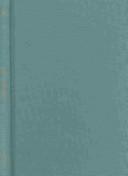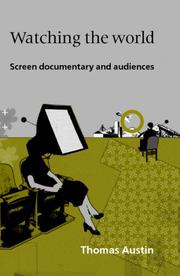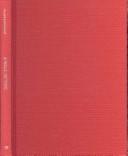| Listing 1 - 10 of 16 | << page >> |
Sort by
|
Book
ISBN: 9048537088 9462985847 9789462985841 Year: 2018 Publisher: Amsterdam: Amsterdam university press,
Abstract | Keywords | Export | Availability | Bookmark
 Loading...
Loading...Choose an application
- Reference Manager
- EndNote
- RefWorks (Direct export to RefWorks)
Stories are perceived as central to modern life. Not only in narrative entertainment media, such as television, cinema, theater, but also in social media. Telling/having "a story" is widely deemed essential, in business as well as in social life. Does this mark an intensification of what has always been part of human cultures; or has the realm of "story" expanded to dominate twenty-first century discourse? Addressing stories is an obvious priority for the Key Debates series, and Volume 7, edited by Ian Christie and Annie van den Oever, identifies new phenomena in this field -- complex narration, puzzle films, transmedia storytelling -- as well as new approaches to understanding these, within narratology and bio-cultural studies. Chapters on such extended television series as Twin Peaks, Game of Thrones and Dickensian explore distinctively new forms of screen storytelling in the digital age. With contributions by Vincent Amiel, Jan Baetens, Dominique Chateau, Ian Christie, John Ellis, Miklós Kiss, Eric de Kuyper, Sandra Laugier, Luke McKernan, Jose Moure, Roger Odin, Annie van den Oever, Melanie Schiller, Steven Willemsen, Robert Ziegler.
Storytelling in mass media. --- Mass media --- Screens --- surface --- depth --- seeing --- touching
Book
Year: 1653 Publisher: [London? : s.n.,
Abstract | Keywords | Export | Availability | Bookmark
 Loading...
Loading...Choose an application
- Reference Manager
- EndNote
- RefWorks (Direct export to RefWorks)
eebo-0021
Book
ISBN: 9048531691 9789048531691 9789462981904 9462981906 Year: 2016 Publisher: Amsterdam Amsterdam University Press
Abstract | Keywords | Export | Availability | Bookmark
 Loading...
Loading...Choose an application
- Reference Manager
- EndNote
- RefWorks (Direct export to RefWorks)
We live in an era of screens. No longer just the place where we view movies or watch TV at night, screens are now ubiquitous, the source of the majority of information we consume daily, and a crucial component of our basic interactions with colleagues, friends, and family. And this transformation has happened almost without us realizing it-and certainly without the full theoretical and intellectual analysis it deserves. Screens brings together scholars from a variety of disciplines to analyze the growing presence and place of screens in our lives today. They tackle such topics as the archaeology of screens, film and media theories about our interactions with them, their use in contemporary art, and the new avenues they open up for showing films and other media in non-traditional venues.
Cinematography --- Philosophy. --- Photography --- Chronophotography --- Animated pictures --- Motion pictures --- Philosophy and psychology of culture --- Mass communications --- Film --- Screens, surface, depth, seeing, touching.
Book
Year: 1648 Publisher: London : printed for Iohn Wright, at the Kings Head in the Old Bailey,
Abstract | Keywords | Export | Availability | Bookmark
 Loading...
Loading...Choose an application
- Reference Manager
- EndNote
- RefWorks (Direct export to RefWorks)
eebo-0018
Book
Year: 1648 Publisher: [S.l. : s.n.],
Abstract | Keywords | Export | Availability | Bookmark
 Loading...
Loading...Choose an application
- Reference Manager
- EndNote
- RefWorks (Direct export to RefWorks)
eebo-0018

ISBN: 1282762893 9786612762895 0520937112 9780520937116 6612762896 9781282762893 0520236238 9780520236233 0520238117 9780520238114 Year: 2003 Publisher: CA University of California Press
Abstract | Keywords | Export | Availability | Bookmark
 Loading...
Loading...Choose an application
- Reference Manager
- EndNote
- RefWorks (Direct export to RefWorks)
Why/Why Not presents a speaker caught in quandaries created by changing perspectives, fervors, and locales. Why do we act one way here and another there; why can't a mind stay made up; why do we hate and love at the same time; why does memory fade or insist; why does the ordinary seem so uncanny? These questions are captured in lines that collide and merge, in irreverent and offhand jibes, and in plaintive repetitions.Why/Why Not moves across a vivid terrain-the stage of Hamlet, Phillip Marlowe's Los Angeles, Prague, paintings and gardens-to push through a tangle of ways to make sense of the world. Martha Ronk's poetic language is that of the everyday slightly skewed, as if pieces of an ordinary sentence were missing. Ronk's poems use the repetitive and the banal to explore ways in which language is intertwined with thought and experience.
American poetry --- american poets. --- beauty. --- changing perspectives. --- changing places. --- complex. --- contemporary poetry. --- exploration of language. --- famous poets. --- female speaker. --- hamlet. --- human experience. --- human thought. --- intellectual poetry. --- irreverent. --- literature students. --- los angeles. --- making sense. --- memory. --- narrative poetry. --- phillip marlowe. --- philosophy. --- poetic language. --- poetry collection. --- poetry. --- prague. --- questioning. --- realism. --- repetition. --- thought provoking. --- touching. --- women authors.

ISBN: 1781701776 1847794483 9781847794482 0719076897 0719085586 Year: 2012 Publisher: Manchester Manchester University Press
Abstract | Keywords | Export | Availability | Bookmark
 Loading...
Loading...Choose an application
- Reference Manager
- EndNote
- RefWorks (Direct export to RefWorks)
Screen documentary has experienced a marked rise in visibility and popularity in recent years. What are the reasons for the so-called 'boom' in documentaries at the cinema? How has television documentary met the challenge of new formats? And how do audiences engage with documentaries on screen? Watching the world extends the reach of documentary studies by investigating recent instances of screen documentary and the uses made of them by audiences. The book focuses on the interfaces between textual mechanisms, promotional tactics, and audiences' viewing strategies. Key topics of inquiry are: fi
Documentary films --- Documentary television programs --- Documentaries, Television --- Documentary programs, Television --- Telementaries --- Television documentaries --- Television documentary programs --- Documentary mass media --- Nonfiction television programs --- Documentaries, Motion picture --- Documentary videos --- Factual films --- Motion picture documentaries --- Moving-pictures, Documentary --- Nonfiction films --- Actualities (Motion pictures) --- History and criticism. --- Capturing the Friedmans. --- Etre et Avoir. --- Paradise Lost. --- Touching the Void. --- audiences. --- cinema. --- documentaries. --- promotional tactics. --- textual mechanisms. --- viewing strategies.
Book
Abstract | Keywords | Export | Availability | Bookmark
 Loading...
Loading...Choose an application
- Reference Manager
- EndNote
- RefWorks (Direct export to RefWorks)
eebo-0018
Book
ISBN: 1283362899 9786613362896 0226811379 9780226811376 9780226811383 0226811387 9781283362894 Year: 2011 Publisher: Chicago, IL University of Chicago Press
Abstract | Keywords | Export | Availability | Bookmark
 Loading...
Loading...Choose an application
- Reference Manager
- EndNote
- RefWorks (Direct export to RefWorks)
Heightened awareness of the problem of sexual abuse has led to deep anxiety over adults touching children-in nearly any context. Though our society has moved toward increasingly strict enforcement of this taboo, studies have shown that young children need regular human contact, and the benefits of breastfeeding have been widely extolled. Exploring the complicated history of love, desire, gender, sexuality, parenthood, and inequality, Erotic Attunement probes the disquieting issue of how we can draw a clear line between natural affection toward children and perverse exploitation of them. Cristina L. H. Traina demonstrates that we cannot determine what is wrong about sexual abuse without first understanding what is good about appropriate sensual affection. Pondering topics such as the importance of touch in nurturing children, the psychology of abuse and victimhood, and recent ideologies of motherhood, she argues that we must expand our philosophical and theological language of physical love and make a distinction between sexual love and erotic love. Taking on theological and ethical arguments over the question of sexuality between unequals, she arrives at the provocative conclusion that it can be destructive to completely bar eroticism from these relationships.
Parent and infant. --- Mothers --- Touch in children. --- Sexual excitement. --- Sexual behavior. --- parenting, children, parenthood, ethics, ethical, sensual, sensuality, equality, abuse, sexual, sexuality, anxiety, touching, childhood, affection, physical, physicality, taboo, contact, breastfeeding, love, desire, gender, inequality, perverse, exploitation, theory, theoretical, culture, appropriate, inappropriate, nurture, psychology, victim, motherhood, language, theology, religion.

ISBN: 1282772198 9786612772191 0520940741 9780520940741 9780520251359 0520251350 9780520251366 0520251369 Year: 2007 Publisher: Berkeley University of California Press
Abstract | Keywords | Export | Availability | Bookmark
 Loading...
Loading...Choose an application
- Reference Manager
- EndNote
- RefWorks (Direct export to RefWorks)
Buchenwald survivors Ilona and Henia Karmel were seventeen and twenty years old when they entered the Nazi labor camps from the Kraków ghetto. These remarkable poems were written during that time. The sisters wrote the poems on worksheets stolen from the factories where they worked by day and hid them in their clothing. During what she thought were the last days of her life, Henia entrusted the poems to a cousin who happened to pass her in the forced march at the end of the war. The cousin gave them to Henia's husband in Kraków, who would not locate and reunite with his wife for another six months. This is the first English publication of these extraordinary poems. Fanny Howe's deft adaptations preserve their freshness and innocence while making them entirely compelling. They are presented with a biographical introduction that conveys the powerful story of the sisters' survival from capture to freedom in 1946.
Holocaust, Jewish (1939-1945) --- Karmel-Wolfe, Henia --- Karmel, Ilona, --- Wolfe, Henia Karmel --- -Karmel, Henia --- Karmel, Henryka --- 20th century jewish literature. --- 20th century polish poetry. --- buchenwald survivors. --- buchenwald. --- captivity. --- concentration camp. --- forced labor. --- forced marches. --- hardship. --- heartbreak. --- holocaust studies. --- holocaust. --- human struggles. --- jewish literature. --- jewish studies. --- judaism. --- krakow. --- memory. --- nazi germany. --- nazi labor camps. --- nazis. --- poems. --- poetry collection. --- poetry. --- poland. --- remember. --- resistance. --- s mark taper foundation imprint in jewish studies. --- second world war. --- survival. --- survivor. --- touching. --- tragedy.
| Listing 1 - 10 of 16 | << page >> |
Sort by
|

 Search
Search Feedback
Feedback About UniCat
About UniCat  Help
Help News
News